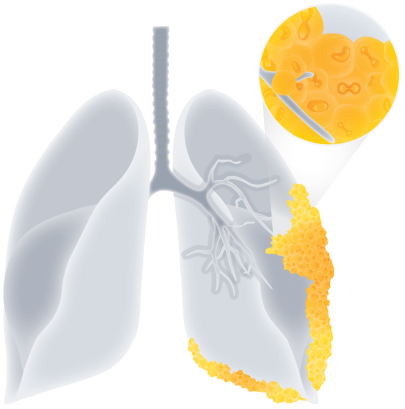Get A Free Legal Consultation
- We fight to maximize your results
- Many clients get results in as few as 90 days
- No out-of-pocket costs for you or your family



Stages of mesothelioma are used to describe how far cancer cells have spread throughout the body. While only pleural mesothelioma uses an official staging system, other forms of this cancer are classified as early or late stage.
If you were diagnosed with mesothelioma, you may be eligible to pursue compensation that can help pay for medical expenses. Call (800) 326-8900 now to see if Simmons Hanly Conroy can help your family.
Pleural mesothelioma forms in the lining of the lungs and accounts for 80-85% of all mesothelioma cases. This cancer has four distinct stages that are used to identify how advanced the disease is.
Each stage is categorized by the TNM system, which was created by the American Joint Committee on Cancer (AJCC). TNM stands for tumor, nodes and metastasis.
The TNM system analyzes:
Unfortunately, because symptoms may not appear for 10-50 years after initial exposure to asbestos, mesothelioma is often not diagnosed until it’s spread throughout the body.
An earlier mesothelioma diagnosis often allows for a greater range of treatment options.

In stage 1 of pleural mesothelioma, the cancerous tumor remains localized in the lining of the lungs. The cancer has not yet spread to the lymph nodes or other organs.
Treatment options for pleural mesothelioma in stage 1 include:
The average life expectancy for stage 1 pleural mesothelioma patients is about 21 months.

When mesothelioma tumors grow larger and start to invade other areas of the body, doctors define this as stage 2 pleural mesothelioma.
Treatment options for stage 2 pleural mesothelioma may include:
The average life expectancy for stage 2 pleural mesothelioma patients is about 19 months.

In stage 3 pleural mesothelioma, mesothelioma cancer cells have invaded an entire area of the body. Tumors may grow into nearby organs, and cancer cells may travel through the body via the lymph nodes.
Treatment at stage 3 focuses on pain relief and extending life expectancy:
The average life expectancy for stage 3 pleural mesothelioma patients is about 16 months.

Stage 4 pleural mesothelioma occurs when tumors begin forming in multiple areas of the body.
Treatment options for stage 4 mesothelioma are limited:
The average life expectancy for stage 4 pleural mesothelioma patients is about 12 months.
In addition to pleural mesothelioma, there are three other types of this cancer. Peritoneal mesothelioma forms in the lining of the abdomen and makes up 10-15% of cases each year.
Pericardial mesothelioma, which forms in the lining of the heart, and testicular mesothelioma, which forms in the lining of the testes, both account for less than 1% of cases.
These types of mesothelioma are only defined by two stages:
The symptoms may vary based on the type of mesothelioma you have and the stage the cancer is at.
At Simmons Hanly Conroy, our mesothelioma lawyers have decades of experience working with mesothelioma patients and their families.
We understand just how expensive mesothelioma treatments are, which is why we strive to get our clients the most amount of compensation possible as quickly as possible.
As a leading national mesothelioma law firm, Simmons Hanly Conroy has recovered over $10.4 billion for individuals and families devastated by mesothelioma and other asbestos-related diseases.
For decades, asbestos companies put people at risk with their dangerous products. Our mesothelioma lawyers work to hold these companies responsible for their greed — and help families find the financial security they deserve.
If you or a loved one has been diagnosed with mesothelioma at any stage, call (800) 326-8900 now for a free, no-obligation consultation.


For over 40 years, John did residential, commercial and industrial construction work. While on the job, he was exposed to asbestos routinely — but no one warned him about the dangers of exposure.
Decades later, John was diagnosed with mesothelioma. Sadly, because of the long latency period of this cancer, symptoms didn’t appear for years, allowing the cancer to spread.
“They did a CT Scan. Then we went in for the results. That’s when he just said, ‘You have stage 4 mesothelioma, John.’ We were shocked.”
– Dee, John’s Wife
By working with Simmons Hanly Conroy, John and his wife Dee were able to hold the companies responsible for his exposure accountable and secure financial compensation for treatment.
“Hiring Simmons Hanly Conroy was the smartest thing we ever did.”
– John, Mesothelioma Patient & Firm Client
Thanks to the treatment he received, John has been a stage 4 pleural mesothelioma survivor for several years now.
Mesothelioma tends to spread very quickly. While it is considered an aggressive disease, seeking treatment from mesothelioma specialists may help to slow the spread of cancer cells throughout the body.
Call (800) 326-8900 now to get help finding a mesothelioma specialist and pursuing compensation to help pay for your treatments.
Pleural mesothelioma has 4 official stages that describe how far the cancer has progressed throughout the body.
The pleural mesothelioma stages are:
For all other types of mesothelioma, doctors categorize the disease as early stage or late stage depending on if the cancer has begun to spread throughout the body.
In stage 4 mesothelioma, the cancer has spread to distant parts of the body, which may cause additional symptoms to develop.
Some late-stage mesothelioma symptoms include:
Talk with your doctor about what you’re experiencing, so they can help manage your symptoms.
Yes. Although rare, it is possible for mesothelioma treatment to be effective enough that cancer cells are no longer growing. A mesothelioma specialist can develop a personalized treatment plan to best address your situation.
If you need help finding a specialist, contact us now for free. Our on-staff nurses can help connect you with a mesothelioma doctor and cancer center near you.